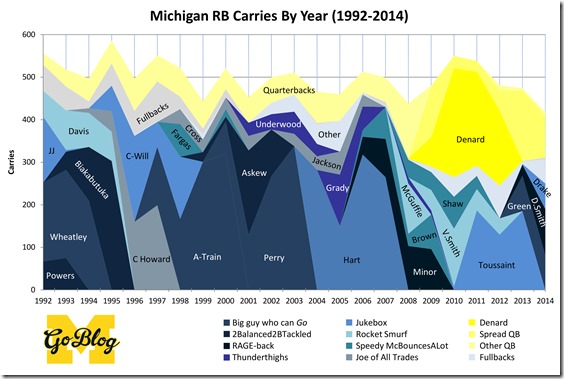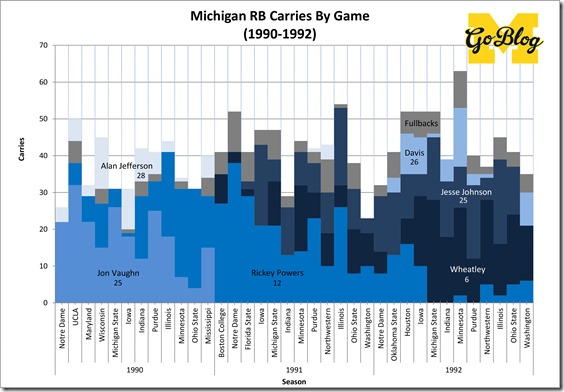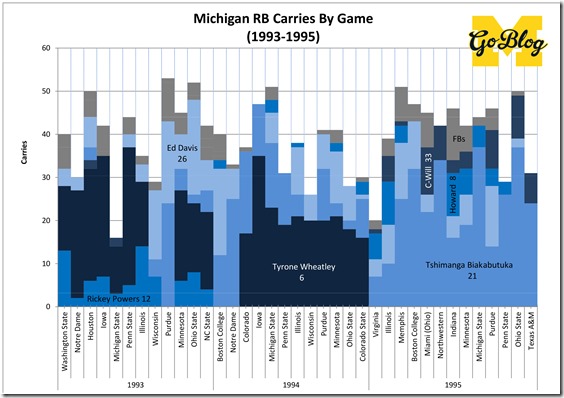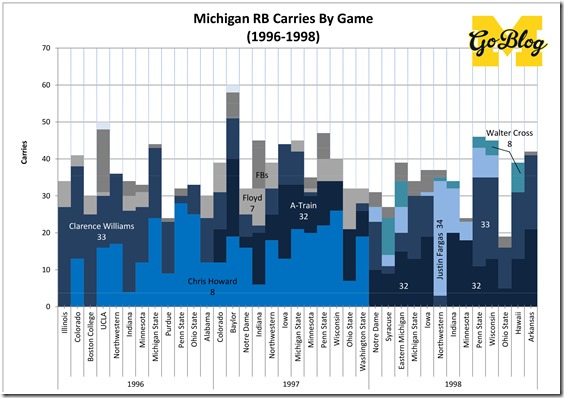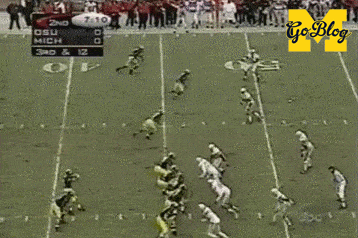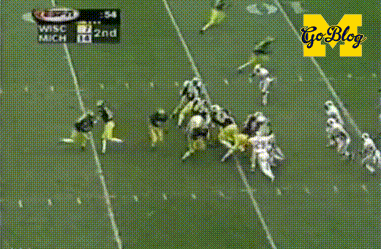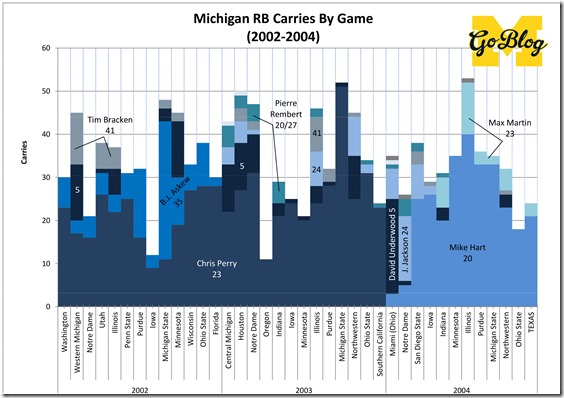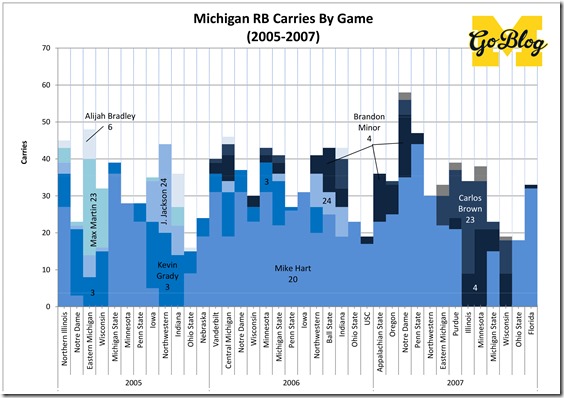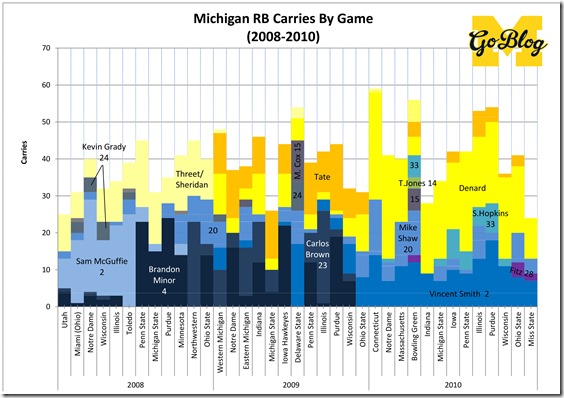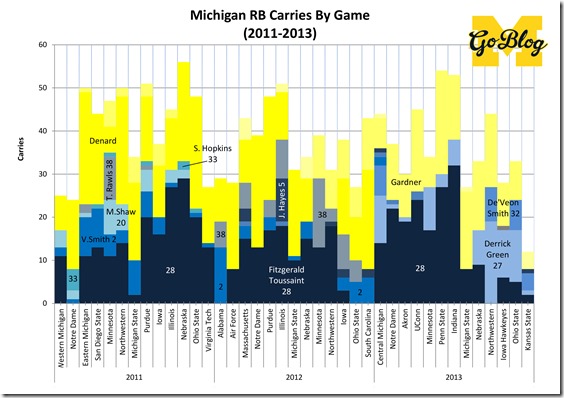Fred Jackson has been a fixture at Michigan going back not one but two undefeated seasons. He arrived in 1992 to join Gary Moeller's staff. Since then, including a two-season stint as Lloyd Carr's first offensive coordinator, Jackson coached (and showered superfluous praise upon) over 100 running backs.
This site has correctly pointed out numerous flaws in the RBs over the last few seasons. It's difficult to diagnose what's coaching and what's just a certain back's ability. Every time we run into Vincent Smith, which is often, either Brian or I have pestered him about why nobody else can block like he could, and Vince just smiles and says "it's hard." Jackson himself has said that vision and ability are nature, blocking is a mentality, and the most he can really do is teach them whom to block.
| Best Backs of the Jackson Era | ||
|---|---|---|
| Player | Yds | YPA |
| Mike Hart | 5,040 | 4.97 |
| Anthony Thomas | 4,472 | 4.84 |
| Chris Perry | 3,696 | 4.56 |
| Tyrone Wheatley | 3,630 | 5.28 |
| Tshimanga Biakabutuka | 2,810 | 5.95 |
| Ricky Powers* | 2,554 | 4.86 |
| Fitzgerald Toussaint | 2,290 | 4.49 |
| Clarence Williams | 1,986 | 4.25 |
| Chris Howard | 1,876 | 4.49 |
| Brandon Minor | 1,658 | 5.01 |
| B.J. Askew | 1,580 | 4.61 |
| *Powers had another 1,945 yds at 5.07 YPA prior to Jackson's arrival | ||
His results are mixed; Jackson coached four of the top ten leading rushers in school history (and his guys blocked for a fifth). On the other hand only two of his guys—Wheatley and Biakubutuka—cracked 5 yards per carry for their careers, a feat accomplished by nine of the guys coached by Jackson's predecessor Tirrell Burton.
What isn't hard to find is effusive praise about Jackson as a person and as a coach, from his former wards to high school coaches across Michigan. Like the coaches of Canham's era, Fred is a permanent fixture of the Michigan Athletic Department, a relationship that goes back to when Fred was Rick Leach's quarterbacks coach in high school.
The thing that really kept Jackson here through the tenure of four coaches was his ability to recruit the state of Michigan. There was a time when Michigan barely had to work to get homegrown kids, when Michigan Replay was the best access most local coaches had to any college football program, and the local press ignored anyone else. Today the in-state rival is on a roll, and there are as many Saban/Perles/Duffy/Dantonio guys in the state's coaching ranks as there are Michigan dudes. While Michigan's mainstream beat has four Rosenbergs trying to make a name for themselves at the expense of the program for every Angelique, the Spartans own an army of slappies. The current generation of recruits were born after the peak of Carr, and can only remember a few crazy 4-point wins over Notre Dame as great Michigan moments.
Michigan has veritably owned Michigan regardless.
This month, Jackson retired, the position he held for 23 years going to one of his first acolytes at Michigan. I choose not to let such a career pass quietly. I also choose not to review his career statistically, or at least not by utter performance. Rather, I'd like to chart our way through this long career in simple carries. Full data is here.
The bar graphs after the jump don't tell a story; they're there help jog the stories of so many storied running backs and fullbacks to come through here since I was 12.
[After the jump, a review of the backs in the Time of Jackson and the carry distribution between them from game to game.]
1992: The Four-Headed Monster
I decided to include 1990 and '91 to compare with distribution in Moeller's two seasons prior to Jackson. The chart shows the story everyone knows: beginning his freshman year, Tyrone Wheatley slowly siphoned carries away from Ricky Powers and Jesse Johnson. With Ed Davis, they called them the "Fab Four":
(start at 1:04)
Jesse Johnson was kind of a proto-Mike Hart: a small guy with great vision and balance, plus that little stutter step (see also: two runs starting at 10:51 above); he didn't have Hart's engine after contact or weird anti-fumble juju though.
That video above is from the MSU game, a week after 200+ yards on 19 carries against Iowa put Wheatley securely at the top of that pecking order (he'd been the first among equals since 1991 OSU). From then on Michigan's primary offense was giving Wheatley the ball, with enough carries available that Powers and Davis (in '93) and Biakabutuka (in '94) still got 12 or so a game.
In '95 Fred Jackson was Lloyd's offensive coordinator, and Michigan ran from under center a lot. In fact whenever I think about the 1995 season the only thing that comes to mind is Musberger saying "Biakabutuka."
1996-1998: A Very Long Setup to Passing
1996 was the dawn of C-Will, a now largely unremarked clone of Jamie Morris whom Michigan fans adored so much that many started not liking Chris Howard, a steady and unspectacular guy who ran forward on ISOs for 20 times a game to set up the downfield passes to tight ends. C-Will had an interesting method of pass pro: he'd get completely run over by a linebacker, then would just hang onto that dude like a baby koala.
The underrated thing about this era was Chris Floyd, who has some light gray carries broken out from the general fullback gray in the chart above. Think of 1996 or '97, and the epic amount of time Brian Griese (et al.) spent in the pocket sometimes. On passing downs Michigan would often have Floyd as the lone back, and he would crush someone.
Immediately after Floyd came the living embodiment of the perfect H-back. I need not name him, or describe him; rather I shall show you a single play, and the look he put on Barry Alvarez's face.
DOn't watch A-Train; watch the three dudes who were set up on the outside to tackle A-Train. Okay, watch A-Train glance at the pursuit then do a half-second double-take because he couldn't believe what he'd just seen. Neither could Barry.
There was some discussion of A-Train after the "who's the other guy you liked in 1997" roundtable; as you can see Thomas never got a majority of the carries his first two seasons; the one day he was out was "That Justin Fargas Game."
1999-2004: The A-Train, Askew, Chris Perry, then Who?
Fargas and Cross were two of the most highly rated backs in the 1998 class, but neither could unseat A-Train. There were games (see Indiana above) when basically the entire offense was handing it off to Thomas until it was 3rd and long and time to pass to Marcus Knight ('99), David Terrell ('00), or Marquise Walker ('01).
When Thomas graduated we all figured Chris Perry would assume the job. Perry had looked awesome in a victory cigar role in '99, but Perry was hurt against WMU and Askew, theretofore a sometime-fullback, emerged.
A little side-story: a colleague at the Daily one time was telling us he was going to meet with Fred Jackson for a story he meant to do after the signing of Kelly Baraka about how Baraka/Fargas represented a new approach to RBs at Michigan. I went to go find the article in the paper the next day, and instead of that found an interview with Jackson about how B.J. Askew is the most fundamentally sound football player he's ever seen.
Perry did take over the starting gig in 2002 with Askew at fullback except for the MSU game I don't want to talk about. In 2003 Perry was the nation's best RB. The '03 offense had a senior Navarre and all three of Braylon/Avant/Breaston available, and yet in that year's RPS, if paper was a bomb to Bray, rock was give to Perry, and scissors was screen to Perry. There was of course the 50-carry day. The subtext of that, however, was we were kinda iffy on who comes next.
[Warning: Cool Story Bro]
I've been wanting to tell this cool story bro forever around these parts so here it is: In the summers before 2003 and '04 I was umpiring Rec softball, and the football guys had a couple of softball teams. Underwood was on one of them, and as the primary (albeit unremarkable) backup to Perry I assumed he'd start in 2004. One day he didn't bring his MCard, which we had to scan for guys to play. Typically I had (/checks statute of limitations) no compunction about letting football players play anyway, figuring the point of the MCards is just to confirm they're Michigan students. But David didn't wait for me to say "okay don't worry about it" before sprinting across Elbel Field to retrieve it at…at about the same speed I can go.
His teammates were screaming at him to go faster than the fullbackian plod we were watching, I was yelling "dude just bring it to me after," because this would hold up the game, and Tim Bracken starts running after him, and caught him about halfway down the field. The two walk back, all the while his teammates giving him crap about what you could charitably call 70 speed in an EASports game.
[CSB ends]
Michigan also had Pierre Rembert in the wings, and Jerome Jackson was a kind of "Joe of all trades" whom Fred plucked while recruiting his teammate LaMarr Woodley. If a freshman won the job we figured Max Martin would be more likely than a 3-star non-speedster from New York. Look at the 2004 season and see how that worked out. Underwood was indeed the feature back against Miami (NTM) but was hurt at the start of the ND game. Jerome Jackson played against Notre Dame and was as reports said: just-okay in all facets.
Then Hart. Hart had 121 yards against SDSU, 99 vs Iowa, 79 against Indiana, 163 vs Minnesota, then three 200+ days in a row against Illinois, Purdue, and MSU. He got those by juking, accelerating, bowling, churning, and when there was nobody else in front of him, chugging until someone inevitably caught up to him. Blogs sprouted across the internet, and each one remarked upon his shiftiness, his engine, and his smile.
2005-2007: If I Only Had More Hart
Rembert saw the writing on the wall and transferred in '04. Martin saw that Michigan was bringing in a 5-star back in the class after him, and followed. When Hart was healthy there really wasn't much room for other guys, but Hart wasn't always healthy.
| 2005 With and Without Hart | ||
|---|---|---|
| Opponent | Hart Runs | Team YPA |
| Northern Illinois | 27 | 4.38 |
| Notre Dame | 3 | 3.61 |
| Eastern Michigan | 0 | 4.23 |
| Wisconsin | 0 | 4.47 |
| Michigan State | 36 | 5.74 |
| Minnesota | 28 | 3.89 |
| Penn State | 23 | 4.75 |
| Iowa | 5 | 3.60 |
| Northwestern | 0 | 3.84 |
| Indiana | 0 | 4.83 |
| Ohio State | 9 | 2.06 |
| Nebraska | 19 | 3.79 |
A chunk of 2005 therefore went to the underwhelming debut of said 5-star, Kevin Grady, who was basically Thomas Rawls except hyped.
In 2006 the depth chart was filled with Brandon Minor, who looked like A-Train reincarnate in his backup/run-out-the-clockback role that year. Carlos Brown was a surprise commit with a lot of speed; the first time I saw him late in 2006 season I decided he was going to be converted to cornerback eventually (When "eventually" eventually came I was screaming it).
He wasn't. With Hart's ankle injury in 2007 Brown actually got more carries than his classmate. Neither was very good at finding the holes in Michigan's new zone blocking scheme. Against Michigan State Hart had to come back in, ankle and all, to give Michigan a running game and do Hart things, like pick up a fumble-sack that would have been, at best, in 2nd and 17 and still down 24-14 in the second half, and running it for a first down (at 9:22 of the video below):
I could get stuck on Hart for a long time. He is one of my all-time favorite players.
2008-2010: All the Rage
I decided to show the quarterbacks in the above chart because they were obviously an important part of (or else the majority of) Rich Rod's offenses. Behind some terrible offensive lines, and with either bad quarterbacks or freshman ones, Michigan's backs were pretty much the bright spot of the team. McGuffie was a legend before he arrived; with his injury Michigan turned to Minor. I can give no better summary for his Michigan career than the senior haiku I wrote at its conclusion:
RAGE! RAGE RAGE RAGE RAGE!
RAGE, JUKE, RAGE! RAGE! RAGE! RAGE! RAGE!
My everything hurts.
There was of course plenty of Carlos Brown and his bouncy twin Michael Shaw. We heard all about—and rarely glimpsed—Michael Cox's supposedly impeccable balance. The guy I got excited about was the one who was momentarily shredding Wisconsin's pretty good defense in that game that caused Brian to invoke Henri and had me yelling "HOLDING!!!" so much that the people I watch games with still roll their eyes at me when I complain about holding.
Vincent Smith indeed won the "starting tailback" job in 2010, though in a Denard Power offense that position is mostly lead blocker; this is why Stephen Hopkins was coming into the role later on in the season.
2011-2013: "Manball" by the "Slapping Yourself in the Face With Man Balls" Definition of the Term
Vincent Smith was the consummate Rich Rodriguez back: a Pahokee-tough mini-mite who could block like Chris Floyd and accelerate like Jamie Morris, though he didn't have the jukes, nor did his speed return from his injury to make him a feature guy. We were rightfully terrified of what would happen if Brady Hoke made him into an I-form Power-O runner, though he was boss on that counter screen that led to Michigan's go-ahead TD in UTL1, and in terrorizing Minnesota.
Hoke and Borges desired a feature back and found one in another Rodriguez spread guy coming off an injury, Fitz Toussaint. For all the praise leveled at the guys in the aughts for blocking, Fitz's awful pass protection was probably the lead factor in the growing rumblings about what kind of coaching was going on there. Toussaint's breakout game against Purdue showed us he was a heck of a runner if he got some blocking, but he didn't, and thus spawned the "Poor Damn Toussaint" meme around these parts. PDT broke his leg against Iowa in 2012 as that season limped home.
I'd rather not rehash more of the declining running game in this period, especially the insane Borgesian things that led to 27 for 27 etc. PDT began to create some of his own bad luck by not hitting the right holes. An injury kept him out of practice, which opened the door for 5-star Derrick Green to assume the starting gig for Northwestern through OSU, although 4-star fellow freshman De'Veon Smith's Brandon Minor impression appeared a better option.
Last Year:
Has been wiped from all memory except the "Drake Johnson Game" that turned out to be "Drake Johnson is a decent running back." We were left with an impression that guys with more stars were getting chances even if they weren't the best players.
Summary:
The running game's problems in Hoke's era are probably no more Fred Jackson's fault than the running game's success in Rodriguez's era was his doing. In fact there's a good 20 seasons above when Michigan had a surfeit of seemingly well-coached backs.
AND he was Michigan's best recruiter. I hope that Jackson will be retiring into a kind of coaching emeritus role in which he still gets to spread the gospel of Michigan around Michigan, guide players through school, maintain relationships with coaches, and make damn sure every person sitting with him is hydrated. Thanks Fred!

